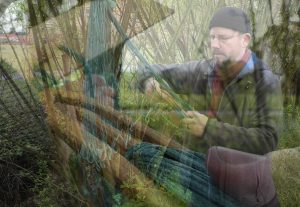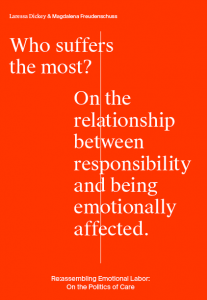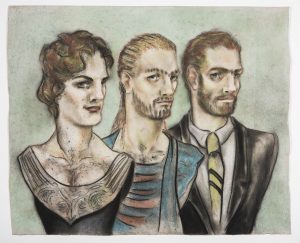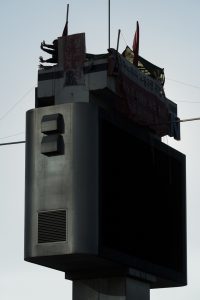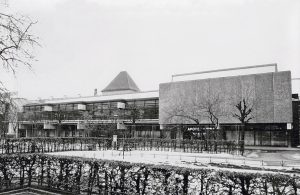Magdalena Freudenschuss
b. 1980, Innsbruck, Austria; lives in Berlin, Germany
Magdalena Freudenschuss is a sociologist, political educator and trainer for transformative Global Citizenship Education. In 2017, she involuntarily took a crash course in crisis management and coping with state repression. She uses art and activism to rework these experiences in collaborative projects with Laressa Dickey (re:assembling emotional labour) and peter steudtner (preparing4prison). Freudenschuss’s most recent research project explored the vulnerabilities of activists in the digital era.
CONTRIBUTIONS
Laressa Dickey / Magdalena Freudenschuss
re:assembling emotional labour, 2019
5 texts; design by NLF, Berlin and Hamburg
Co-produced by Bergen Assembly 2019
Presented at KODE 1 Permanenten / Salon and Belgin
re:assembling emotional labour is a process of re:appropriation and an exploration of emotions and emotional labour in the context of political imprisonment. Laressa Dickey and Magdalena Freudenschuss ‘re:work’ their experiences during 2017 as partners of political prisoners. Five thin booklets offer glimpses into the artistic processing of those experiences. ‘Re:assembling’ goes along with ‘dis:assembling’; the dis:assembly intended by state violence is subverted by the attempt to ‘re:write’ the fabric of self, identity and togetherness.
Addressing themes such as the politics of care, anger as tool, suffering as a unit of measurement, failure as possible transformative moment, and contortions as a dynamic of power and trauma, Dickey and Freudenschuss insist on making space for the invisible work and suffering that is inherent in family crisis. At the same time they invite a critical re-reading, re: assembling emotions like grief, anger, pain, and sadness by looking for the strength, laughter, privilege, solidarity, sisterhood, and paradoxes in all this. By means of text production, this re: assembling process follows the depths and heights of building resilience to trauma as a means of resisting state violence. Feminist perspectives are tools, motivations, references and good company on that path.
Artist and writer Laressa Dickey and sociologist and political educator Magdalena Freudenschuss involuntarily took a crash course in crisis management and coping with state repression in 2017 when their partners became political prisoners. Together with their partners, Ali Gharavi and peter steudtner, they use art and activism to rework these experiences in different projects. For the Bergen Assembly, Dickey and Freudenschuss collaborated on five texts on the politics of care.
Magdalena Freudenschuss / peter steudtner
re:assembling solidarity, 2019
Installation with coloured ropes and imprinted text messages
Co-produced by Bergen Assembly 2019
Presented at Bergen Kjøtt
re:assembling solidarity is a work concerning the artists’ experiences of solidarity during steudtner’s imprisonment as a human rights defender (one of the Istanbul 10). The ‘hammock of solidarity’ consists of strings of textiles imprinted with messages of solidarity that he received in 2017, during his imprisonment in the high security prison of Silivri in Turkey. The printed strings were handwoven into a hammock that now invites visitors to stop and rest. The other side of the installation shows the continuation of the strings as a number of ropes of different texture and design. Some of these are woven into the hammock while others lay loose, or are knotted. On the one hand, steudtner was carried and held by solidarity; on the other hand, solidarity was the result of hard, emotional work by the family and other supporters who organized crisis management and solidarity ‘on the outside’. The diverse textures of the ropes correspond to the complex and varied affective states experienced by family in crisis and solidarity work outside of the prison.
Magdalena Freudenschuss / peter steudtner
preparing4prison, 2019
www.preparing4prison.org
Presented at Bergen Kjøtt
preparing4prison (p4p) collects experiences, stories and best practices of the involuntary assemblies of people imprisoned due to their activism. It brings these together with the insights and perspectives of their supporters, their families and their lawyers. Virtually assembled at www.preparing4prison.org, p4p offers an easily accessible crisis response kit that does not prescribe a certain way of coping with this particular kind of crisis, but allows for inspiration and guidance as much as for rejection of the proposed strategies.
The work gathers a multiplicity of voices that speak from different positions, in different contexts. Starting from their own experience around the case of the Istanbul 10, Freudenschuss and steudtner collected experiences, stories and tips from human rights defenders who were subjected to arrest and imprisonment. They invited affected family members and lawyers to share their insights, feeding their lived knowledge of bodies, affects, relations and tactics back to the community of human rights defenders. In this way, preparing4prison manifests the involuntary assembly of prisoners and their close environment, and constitutes a voluntary assembly of allies.
The online resource is made available for appropriation, adaptation and repurposing, for example in workshops that take place during the Bergen Assembly. Freudenschuss and steudtner open the space to local activists, as well as to participating artists, inviting them to add to the assembled stories and experiences. Users of p4p might individually or collectively reassemble the content for their own purpose.
RELATED EVENTS
preparing4prison (presentation and Q&A, 30’)
preparing4prison(p4p) collects experiences, stories, and best practices of the involuntary assemblies of people imprisoned due to their activism. It combines them with the insights and perspectives of their supporters, their families, and their lawyers. Virtually assembled, p4p offers an easily accessible crisis set that does not prescribe a certain way of coping with this particular kind of crisis, but allows for inspiration and guidance as much as for rejection of the proposed strategies. In the p4p workshops within Bergen Assembly 2019, Magdalena Freudenschuss and Peter Steudtner open the space up to local activists as well as to participating artists, inviting additions to the assembled stories and experiences, and allowing for the individual or collective reassembling of the collection.
RELATED PLATFORMS
Exhibition
The Parliament of Bodies

